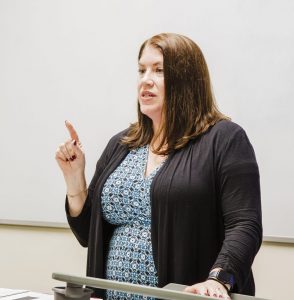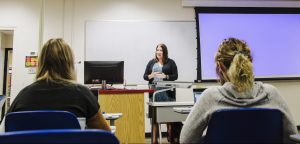 Why did you get into the field of behavioral science?
Why did you get into the field of behavioral science?
I love behavior analysis and studying the science of human behavior. I had the fortunate opportunity to work with individuals with Autism spectrum disorder early in my career. During this time, I fell in love with the possibility and the hope that surrounds situations where families feel hopeless and full of concern about what the future might bring for their children.
Part of working as a behavioral analyst and as a trained practitioner is being able to help children and young adults live independent lives. This begins in ways a lot of families take for granted like teaching them to eat different foods, be out in the community, order at a restaurant, complete chores, and use the bathroom independently. These accomplishments are monumental in some households and being able to make a difference and help these individuals and their families meet their goals means so much to me. It is a huge responsibility and I take it very seriously.
What sets applied behavior analysis apart from other programs?
In the Daemen University Behavioral Science Department, our faculty are experts in behavioral analysis and each have a different area of expertise. Some of us have experience working in classrooms with people with intellectual and developmental disabilities, while others have experience working in public policy with the foster care system and juvenile justice. Also, others have experience in elementary verbal relations and stimulus equivalence.
In addition, there are four of us who are board members with the New York State Association for Behavioral Analysis. As part of being on the board, we have our finger on the pulse of what is currently happening in the field at the state, national, and international level.
Why do people go into the behavioral science field?
Often our students come to us to study behavioral science because, at some point, it has touched their lives personally. They often have a family member or community member that has benefited from how behavioral science can help improve lives and help people meet their goals.
For example, we have had students who are parents or siblings of people with a developmental disability. They’ve seen the science work wonders and help not only the individual receiving services, but also the family system.
Can you tell us about your online program?
What is exciting about our behavioral science department is that we have both an on campus program where we meet face-to-face in the traditional format with students, as well as a robust online program.
I am proud to say that our online graduate program was Daemen’s first fully online graduate program, which is fully equivalent to our in-person, traditional program. It is equally rigorous and presents the same instructional opportunities and connection with faculty.
Can you tell us an interesting fact about yourself?
I was able to participate as a subject matter expert with the Behavioral Analyst Certification Board and was invited to be a part of the committee that helped develop the Registered Behavior Technician, or RBT, credential for the field of behavioral analysis. This means I helped put together a uniform set of standards for entry level behavior analyst practitioners.
Can you tell us what your students do after graduation?
I can confidently say our graduates have a 99 to 100 percent employment rate. Our students are very marketable. Many of our students are already employed in the field of behavioral analysis in the role of registered behavior technician as they are gaining experience to become a certified and licensed behavioral analyst. Therefore, almost all of our students are fully employed before they graduate.
Dr. Vicki Knapp is an associate professor, as well as the executive director and chair of the Daemen University Behavioral Science Department.

